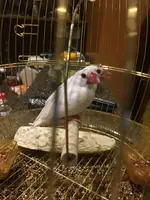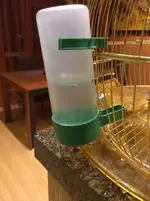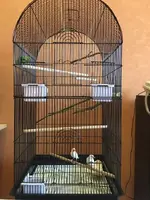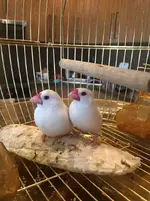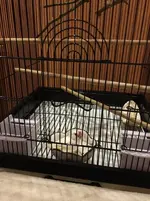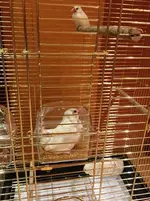Welcome! I apologize ahead of time for this long post, but as a new bird-owner, there is a lot to learn.
When have a bird, any sort of heated mechanism (anything that heats or is heated) and contains PTFE/PFOA/PFCs/Teflon will be out of the question (and most things that heat up or are intended to be heated DO contain these chemicals)--This includes things like pots, pans, cupcake trays, cookie sheets, cake pans etc, but it will also things like include hair-dryers, straighteners, curling irons, curlers, rice-cookers, SLOW COOKERS, popcorn poppers, air fryers, microwave meals (including certain types of microwave popcorn), steamers, irons, ironing board covers, electric skillets, griddles, George Foreman Grills, drip trays, toasters, toaster ovens, poaching pans, electric blankets, humidifiers, heat lamps, SPACE HEATERS, etc etc...
To find out what contains PTFE/PFOA/PFCs/Teflon, you have to call and be a bull about it over the phone (and in some cases, you won't get far). Almost always, it will take a few days for them to get back to you and you must provide the full chemical names, abbreviations and brand-names. Shopping when you have a bird is super annoying..You cannot visually ID these chemical coatings, as they can be colored, transparent, or mixed into metal/fabric during the manufacturing process. Teflon and chemically similar products have killed birds on separate floors with the doors shut. Similarly, while DuPont claims that off-gassing only occurs at higher heats, there have been myriad bird deaths (even within academic circles) at temperatures well within the 300 degree F range! There is a reason they used canaries in coal-mines and it is because they die very easily due to even low levels of fumes of any sort.
Sleep=essential to hormonal and immune function. Different species have different requirements, but you have to figure out what these are and stick to them. This means that someone must be there to cover and uncover the bird at the same time each night and that your home must be conducive to sleep.
Make sure you aren't using any unsafe products around the bird. This is pretty much everything with a scent (and some things without).
No perfume, carpet cleaner, flea shampoo, aerosols, solvents, air fresheners, paints, smoke of any kind, vaping, sunscreen, bugspray, candles of any kind (organic or non), insecticides, certain soaps/shampoos, fire-places, burning or heated oil/fat, self-cleaning ovens, gas and any household cleaners (e.g., bleach, windex, lysol, fabreeze, scrubbing bubbles, kaboom, pine-sol etc)...You will seriously have to re-think your entire home and your cleaning routine will change a ton.
NEVER use the self-cleaning oven function or try to season cast iron around birds.
The list goes on. Birds have VERY sensitive respiratory systems. Essential oils are also fairly unsafe due to their ability to be absorbed into the blood-stream and due to a bird's sensitive air sacs.
This also makes traveling with a bird complicated, as it is very unsafe to bring your bird with you into a location where teflon or chemical cleaners are being used. Unless you are visiting close family and you can give them a 30 hour instructional course on eliminating respiratory dangers from their homes before you get there, it is going to be a bad idea to take your bird (and no one wants to be a pushy guest!).
Generally, you should only pet birds on the head/neck and you should not allow any shadowy spaces in the cage (boxes, bedding, crumbled paper, tents, blankets, low furniture, in clothing etc)...and so are tents/huts/hammocks etc. These things are hormonal triggers and they can cause health and behavior problems.
I would recommend getting an air purifier (non-ozone producing/non-ionizing) to help with dust/mold etc (which can harm birds). Please note- a purifier will not protect birds from cigarette smoke, vaping fumes, teflon/ptfe/pfoa etc. It will only help increase the quality of the air to some extent. You cannot use unsafe chemicals around the bird just because you have a purifier.
Last thing-- Birds hide illness like crazy, so there is nothing intuitive about their diseases. You have to be ready to study your birds poop and behavior daily, because even the slightest change can be a huge indicator. Blood work must be done yearly and should be done soon after you get a new bird. They can spread deadly diseases without showing symptoms---it's a giant pain. Make sure that you have a certified avian vet (CAV) near you. Exotics vets who see birds are not the same thing. If you don't have a CAV near you, your life will be much more anxiety-ridden than if you do (and the difference between a CAV and an exotics vet can mean the difference between life and death for your bird in certain instances).
Oh- and birds are very sensitive to temperature changes and drafts. Any temperature change of 10 degrees or more puts significant stress on their systems. If you have to take your bird out in the cold, make sure you carefully cover the cage and pre-warm the car. Also, make sure you don't have any air-fresheners in the car. Extreme heat can also be harmful. Over time, birds can adjust to a wide ranger of temperatures, but this adjustment has to take place over a long period of time. Anything too quick is going to shock their systems.

